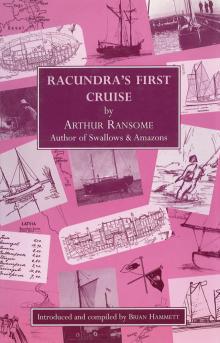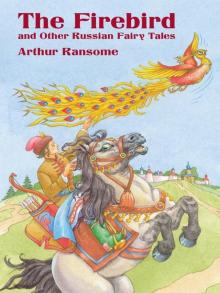- Home
- Arthur Ransome
Peter Duck: A Treasure Hunt in the Caribbees
Peter Duck: A Treasure Hunt in the Caribbees Read online
CONTENTS
Cover
Title Page
Map
Illustrations
Dedication
Note on the Pictures
BOOK ONE
I. QUAYSIDE
II. RED-HAIRED BOY
III. TRIAL TRIP
IV. WASHING THE ANCHOR
V. PETER DUCK SPINS HIS YARN
VI. AND WINDS IT UP
VII. OUTWARD BOUND
VIII. FIRST NIGHT AT SEA
IX. BEACHY HEAD TO THE WIGHT
X. CAPTAIN FLINT’S FIDGETS
XI. WORDS IN THE DARK
XII. BLIND MAN’S BUFF
XIII. DECISION
XIV. QUIT OF THE VIPER
XV. BILL FINDS HIS PLACE
XVI. THE MADEIRAS AT DUSK
BOOK TWO
XVII. TRADE WIND
XVIII. LAND HO!
XIX. ISLAND MORNING
XX. BLAZED TRAIL
XXI. DUCKHAVEN
XXII. GOODBYE TO THE WILD CAT
XXIII. SWALLOW’S VOYAGE
XXIV. DIGGERS’ CAMP
XXV. DIGGERS AT WORK
XXVI. THREATENING WEATHER
XXVII. GREAT GUNS
XXVIII. THE FINDING OF THE TREASURE
XXIX. SPANISH GALLEON
XXX. DIRTY WORK
XXXI. THE ONLY HOPE
XXXII. WHOSE STEPS IN THE DARK?
XXXIII. ALL ABOARD ONCE MORE
XXXIV. WATERSPOUT
XXXV. “BONIES” AND “MALLIES”
XXXVI. “SPANISH LADIES”
About the Author
Also by Arthur Ransome
The Arthur Ransome Society
The Arthur Ransome Trust
Copyright
ILLUSTRATIONS
THE ADVENTURERS SET SAIL frontispiece
THE WILD CAT (HER INSIDE, SAILS AND SPARS)
THE SWALLOWS JOIN THE SHIP
THE RED-HAIRED BOY GOES OVERBOARD
PRACTICE WITH THE HALYARDS
NANCY AND TITTY SHARING THEIR MISERY
THE COOKS’ GALLEY
ROGER’S NIGHT SCENE
RUN DOWN IN THE FOG
SUMS
MAP OF CRAB ISLAND
MORNING SPLASHES
FIRST SIGHT OF CRAB ISLAND
BILL’S LANDING
SWALLOW AT SEA
SETTLING IN AT DUCKHAVEN
HARD AT WORK
THE TREASURE FOUND
THE VIPERS COME ABOARD
IN DUCKHAVEN AT NIGHT
ROGER’S VIEW OF THE WATERSPOUT
THE ADVENTURERS SET SAIL
TO
MRS ROBERT BLACKETT
AND MRS E.H.R WALKER
A HUMBLE APOLOGY FOR THE UNGRATEFUL
BRUTALITY WITH WHICH THEIR CHILDREN
ELIMINATED THEM FROM THESE ADVENTURES.
NOTE ON THE PICTURES
When we began to do these pictures we decided that each of us was to put her (or his) name to her own works of art. But this was hopeless. Everybody wanted to help with every picture, even passing natives who saw what we were doing. So we had to leave all names out except in the case of Roger’s two pictures which anybody would know anyhow.
CAPTAIN NANCY BLACKETT
BOOK ONE
CHAPTER I
QUAYSIDE
He turns his head, but in his ear
The steady trade-winds run,
And in his eye the endless waves
Ride on into the sun.
BINYON
PETER DUCK WAS sitting on a bollard on the north quay of Lowestoft Inner Harbour, smoking his pipe in the midday sunshine and looking down at a little, green, two-masted schooner that was tied up there while making ready for sea. He was an old sailor with a fringe of white beard round a face that was as brown and wrinkled as a walnut. He had sailed in the clipper ships racing home with tea from China. He had sailed in the wool ships from Australia. He had been round the Horn again and again and knew it, as he used to say, as well as he knew the crook of his own thumb. But for a long time now he had left the sea. He lived in an old wherry on the Norfolk rivers, sailing this way and that between Norwich and Lowestoft and Yarmouth and Beccles, sometimes with a cargo of potatoes, sometimes with a cargo of coals, and sometimes with the deck of his wherry piled so high with reeds for thatching that the sail would hardly clear them. But he had not very much to do and every now and then he used to leave his old wherry in Oulton Broad and slip down to Lowestoft to look at the boats and the fishermen and to smell the fresh wind blowing in from the sea. And for two or three days now he had been coming along to smoke his pipe on this particular bollard because he liked the looks of the little green schooner that was lying there moored to the quay.
There was a queer thing about this little schooner. There seemed to be only one man aboard her, a big fat man with a bald head. Peter Duck knew what his name was, for there were two girls helping him, and Peter Duck heard them calling him sometimes “Uncle Jim,” but more often “Captain Flint.” And he heard this Captain Flint calling the girls “Captain Nancy” and “Mate Peggy,” but that, he thought, was probably his fun. The thing that puzzled Peter Duck most was that there didn’t seem to be a crew. Yet anybody could tell that the little schooner was getting ready for sea. Captain Flint and those two girls were for ever running to the ships’ chandler’s in the town and coming back with new canvas buckets, and tins of paint, and marlinespikes, and spare blocks, and what not. And as for the stores that had gone aboard her, Peter Duck had heard from a friend in the Custom-House at the end of the quay, you would have thought she was bound twice round the world and back again. And old Peter Duck looked down at her from the top of the quay and wished he was going too. “Going foreign, she is, to blue water,” he said to himself. And he thought of other little schooners he had known, on the Newfoundland Banks and in the South Seas. He thought of flying-fish and porpoises racing each other and turning over in the waves. He thought of the noise of the wind in the shrouds, and the glow of the lamp on a moving compass card, and tall masts swaying across the stars at night. And he wished he could go to sea once more and make another voyage before it was too late.
That morning Captain Flint and his two nieces had been even busier than usual, tidying up their ship, throwing chips and shavings over the side, swabbing down decks and paintwork and sweeping the dirty water out through the scuppers. And every now and then they kept looking up to the quay and along it towards the Custom-House and the harbourmaster’s office and the road from the railway station. Old Peter Duck, smoking his pipe on the quay, twisted himself round and scratched his head and wondered what they were looking for. And then a telegraph-boy had come along the quay on a red bicycle, and Captain Flint had run up the ladder to meet him, and torn open the orange envelope of a telegram, and given the boy a sixpence and said there was no answer. “Well, that’s done it,” he had said to those two girls. “He can’t come. He can’t come at all. And we can’t start without him. And it’s too late to send a wire to the Swallows. They’ll be here any time now.” All three of them aboard the schooner looked very glum after that. But it was clear that they were expecting someone else besides the telegraph-boy, for Captain Nancy and Mate Peggy still hung about on deck, and kept looking up every two minutes. Perhaps, thought Peter Duck, they were waiting for that crew of theirs. And suddenly, round the corner by the Custom-House, came two boys and two girls, helping a porter to push a handcart along and keeping the luggage on the handcart from tumbling off. On the top of the luggage was a green parrot in a cage. A monkey, on a lead, was hurrying along after the smaller of the two boys. Peter Duck had a look at the
m and thought they must have taken the wrong turning.
*
The four were all talking at once. Something had just happened to startle them.
“Did you see he had gold ear-rings?” asked Able-seaman Titty.
“Why did he look so angry?” asked Roger, the ship’s boy.
“Why shouldn’t old Polly say ‘Pieces of eight!’ if he wants to?” said Captain John.
“Probably it was just a mistake,” said Mate Susan.
“Lucky for you it’s not his vessel you’re looking for,” said the porter.
“Why? Has he got a ship?”
“Black Jake’s not the sort of chap it’s safe to quarrel with,” said the porter. “‘Pieces of eight!’ your bird said. Well, there’s many a boy in this town got a sore head for shouting that after Black Jake. You mustn’t speak of treasure to Black Jake. No. Nor yet of crabs. Look, that’s his ship. That black schooner over there on the other side. This’ll be yours. What did you say her name was?”
“Wild Cat,” said Titty.
“She’s called after our island,” said Roger.
“There’s no name on her that I can see,” said the porter. “They’ve been new painting of her.”
But at that moment Nancy and Peggy looked up and saw them coming along the quay.
“Here they are,” Peggy bent and shouted through the skylight to Captain Flint, who was busy down below.
Peter Duck had another look at the Swallows. So they were for the little schooner, were they? They hadn’t taken a wrong turning after all.
Nancy and Peggy ran to the ladder and climbed up to the quay from the deck of the schooner.
“Here you are at last,” shouted Nancy. “Swallows and Amazons for ever! Come on. She’s a beauty, the Wild Cat. Real bunks in the cabins, one above another. The ones with longest legs have the top bunks. And Captain Flint’s been building a cage for Gibber. It’s the best cabin any monkey ever had.”
“We’ve got a gorgeous galley to do the cooking in,” Mate Peggy called to Mate Susan. “On deck, too, so there won’t be any smells down below.”
“Swallows and Amazons for ever!” John, Susan, Titty, and Roger shouted back, remembering how they had shouted that over the water to each other as their little boats, the Swallow and the Amazon, were sailing home on the last day of those holidays on the lake in the north. There was great shaking of hands. Nancy and Peggy shook hands even with Gibber, and had their fingers nipped a little by the parrot, for old time’s sake. The parrot had been in high spirits ever since the railway journey had come to an end. “Pieces of eight!” he screamed, “Pieces of eight!” just as Nancy had taught him ever so long ago.
“He hasn’t forgotten,” said Nancy.
THE SWALLOWS JOIN THE SHIP
The four Swallows were waving their hands to Captain Flint, who had just come on deck. But at this Titty turned round.
“Of course he hasn’t,” she said. “He’s got a splendid memory. He was shouting it like anything just now, when we were coming out of the station, and there was a man with gold ear-rings …”
“‘What’s that? What’s that?’ the man said,” Roger interrupted. “The man went on saying ‘What’s that? Whose is that bird?’ and he pushed his horrid face at us, and tried to take hold of the cage. Titty wouldn’t let him, but he came with us all the way until the man by the bridge stopped him and told him to leave us alone …”
“How do, Mr Duck?” said the porter, as the old sailor nodded towards the opposite quay where a handsome black schooner was lying. “Aye, it was him. Getting worse then he used to be is Black Jake. We’ll be well rid of him when he gets away. They say he’s off to have another look at them crabs of yours. He’s got the scum of the place with him in that hooker of his.”
Captain Flint came climbing up the ladder to the quay.
“Hullo, Captain John,” he said. “Hullo, Mister Mate. Glad to see you, Able-seaman. Hullo, Roger, not yet tired of being a ship’s boy? Hullo, Polly. And how’s Gibber?”
“We were most awfully afraid we were going to be late,” said John. “The train got held up by something or other. Have you been waiting for us? When are we going to start?”
Peter Duck saw Captain Flint and his two nieces look suddenly grave.
“That’s the whole trouble,” said Nancy.
“We can’t start,” said Peggy.
“We’ve just had the telegram,” said Captain Flint. “The man who was coming with us can’t get away. We’ve got to begin looking round for someone else.”
“We may be days and days,” said Peggy.
“We just can’t help it,” said Captain Flint. “Anything breakable in these bags?”
“No,” said Susan. And Captain Flint and the porter carried four long canvas kitbags to the side of the quay and dumped them over so that they fell on the deck of the schooner.
“Anyway, it’s very jolly just being here,” said John.
“Did Swallow get hurt on the journey?” asked Titty.
“Not she,” said Captain Flint. “Go along and see if you can find a scratch on her. There she is in the davits.1 A fine ship’s boat she will make. And we’ve a good dinghy as well.”
“Good old Swallow,” said Titty, looking down at the little sailing boat that Captain Flint had brought in a crate all the way to Lowestoft from that far-away lake in the north. There she was, hanging from the davits on the starboard side of the schooner, with her oars and her mast and her old brown sail neatly stowed away in her, all ready to be lowered into the harbour. “Good old Swallow.”
They had cleared the handcart by now. Susan had taken her tin box, black, with a red cross on it, full of iodine and things for colds and stomach-aches and sticking-plaster to put on people’s knees. This had been the best of Susan’s Christmas presents and ever since Christmas she had been almost pleased when anybody fell down (it was usually Roger), sorry for him, of course, but pleased to have the chance of patching him up again. John had a small tin box with a compass in it, and a barometer, and a few other things best not stuffed into a kitbag. Roger’s things had all gone into his kitbag, but Gibber had a box of his own, with his blanket in it and a tin mug he particularly liked. Nancy had taken charge of it and was laughing at seeing the monkey’s name in capital letters on the outside of his trunk. Titty had a box full of things for writing and drawing. She also had charge of the little telescope that really belonged to John.
One by one they went down the ladder and aboard the Wild Cat.
“Look out for Polly below there,” called Captain Flint, and Titty was just in time to take the big parrot-cage as it came swinging down on the end of a rope Captain Flint had borrowed from the porter. Roger and the monkey were down already. Roger had started first, pulling Gibber after him, but Gibber was quicker on a ladder than his master, and was pulling at him from below long before Roger reached the deck. John was waiting on the quay to settle with the porter for bringing the things from the station.
“That’s all right,” said Captain Flint. “It’s the ship’s affair, bringing the crew aboard.”
“Dinner’s all ready in the saloon,” said Peggy, as John and Captain Flint joined the others on the schooner’s deck. “I didn’t cook it,” she added hurriedly. “It came from the inn. But we’ll cook the next one ourselves.”
“Come on,” said Captain Flint. “This way. Leave the kitbags on deck for now. Let’s get at dinner and talk things over. Look out. Mind your heads. Oh, I was forgetting that there’ll be plenty of room for most of you. I get a fresh bump or two every time I go below.”
They crowded down the companion-way and a moment later, but for the laughter that kept coming up through the open skylights, anybody might have thought the schooner was deserted. The Swallows and Amazons and Captain Flint were all below deck. Gibber the monkey had gone below with them. Only the parrot, in his cage, had been left on the roof of the deckhouse to enjoy the sunshine. He was preening his feathers after the journey, and talking to himself,
saying sometimes, “Pretty Polly” and sometimes, “Pieces of eight.”
Up there, on the top of the quay, Peter Duck sat on his bollard alone. The porter had trundled his handcart back to the station, but Peter Duck was still sitting on his bollard, smoking his pipe, and thinking. After all, he was thinking, why not? He laughed to himself. He could just hear what his daughters would say to their old father. His mind was almost made up. And he began looking carefully at the masts of the schooner. There were one or two things up there that could do with some little attention.
*
Hungry as they were, for the first few minutes, they could not settle down at the saloon table. There was so much to admire below decks. Nobody had really thought that Captain Flint would keep the promise about taking them to sea in a real ship. And yet here they were, all together once more, and actually afloat, aboard a little schooner. She had been a Baltic trading schooner with a deckhouse with a couple of bunks in it, and a fo’c’sle with a couple more. But Captain Flint had decked over the hold and given it a long skylight. Where, once upon a time, had been cargoes of firewood and potatoes, he had made a saloon, with four cabins opening into it. There was a cabin for John and Roger, one for Susan and Titty, and one for Nancy and Peggy. The fourth cabin was to be a hospital, if necessary. “But, of course,” said Captain Flint, “if anybody is really ill, ill enough to be a nuisance, we’ll put him overboard.” Captain Flint himself was sleeping in the deckhouse, to be within easy reach of the wheel, and the charts. The fo’c’sle had been changed too. He had turned part of it into a big cage for Gibber, so that the monkey had his own bunk, like everybody else, but had it behind bars, so that he could be locked in there if he was getting too much in the way. On either side of the saloon, and in the fo’c’sle, and everywhere else where there was room for them, there were lockers and store cupboards crammed with every kind of tinned food.

 Peter Duck: A Treasure Hunt in the Caribbees
Peter Duck: A Treasure Hunt in the Caribbees Racundra's First Cruise
Racundra's First Cruise Great Northern?
Great Northern? Swallowdale
Swallowdale Swallows and Amazons
Swallows and Amazons Winter Holiday
Winter Holiday Missee Lee: The Swallows and Amazons in the China Seas
Missee Lee: The Swallows and Amazons in the China Seas Pigeon Post
Pigeon Post We Didn't Mean to Go to Sea
We Didn't Mean to Go to Sea The Firebird and Other Russian Fairy Tales
The Firebird and Other Russian Fairy Tales Coot Club
Coot Club The Big Six: A Novel
The Big Six: A Novel Six Weeks in Russia, 1919
Six Weeks in Russia, 1919 Secret Water
Secret Water The Big Six
The Big Six Missee Lee
Missee Lee Peter Duck
Peter Duck The Picts and the Martyrs
The Picts and the Martyrs